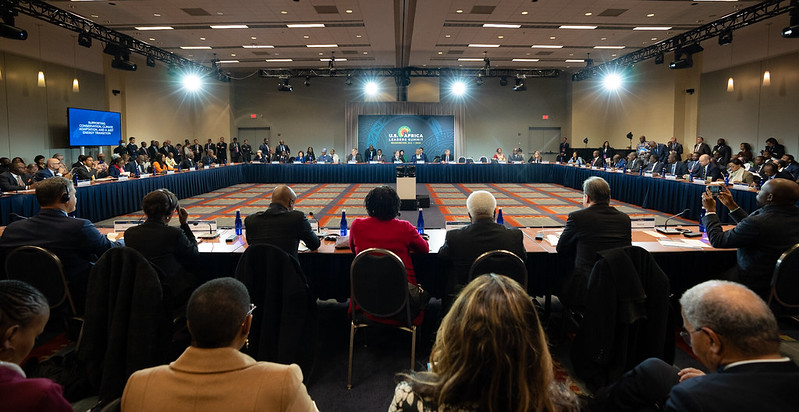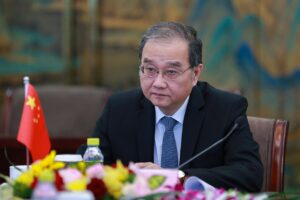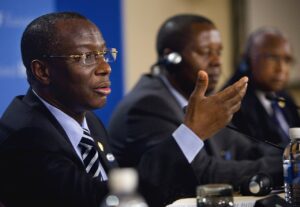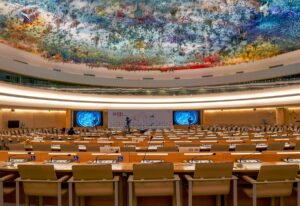During the December 13-15 US-Africa Leaders Summit, the Biden Administration will likely take the opportunity to gauge the depth and strength of its relations with African states’ leaders and to reassert the four pillars of its recently released U.S. Strategy Toward Sub-Saharan Africa. But recent trends ― from the frustration about the United States’ initially limited efforts to help African countries respond to the COVID-19 pandemic to the mixed response across the continent to the United States’ call to rally a coalition against Russia in its war in Ukraine ― indicate that US policies towards the continent have had limited success. Moreover, far from being convincing, the new strategy highlights the contradictions between the administration’s rhetoric and its actions, as well as its apparent inability to move beyond past practices. Within this context, the Biden administration faces challenging questions, including: What role can the United States undertake amidst a growing number of foreign partners in the region? What is the future for its security strategy? And how will it implement commitments such as supporting the implementation of the African Continental Free Trade Area (AfCFTA)?
The October 24-25 Dakar International Forum on Peace and Security in Africa provided insights into these questions. Approximately 1500 participants, including researchers, practitioners, and academics from across the continent and beyond, were joined by high-level representatives from France, India, Japan, Libya, Mali, Senegal, Sudan, and Turkey, among others. US Deputy Assistant Secretary of Defense for African Affairs, Chidi Blyden also attended.
Africans’ fatigue towards the West’s double standards
As the author of this brief argued elsewhere, Russia’s war in Ukraine has been a wake-up call for the United States and its Western allies: contrary to expectations, they were unable to build a global coalition to punish Russia, and instead were openly called out by several leaders across the Global South, including in Africa, for their double standards in their responses to violent crises, and their attempt to pressure others to fall into line. Special Representative for Central Africa and Head of the United Nations Regional Office for Central Africa, Abdou Abarry, stressed during his speech at the Forum the abyssal difference between the rapidity and the level of humanitarian and security financing commitments by Western actors for Ukraine and their inability to respect pledges towards the continent. From the development to the security and the climate sectors, discontent towards the United States’ hypocrisy is likely to rise further, as Africans are increasingly vocal and assertive about their interests.
Controversial statements made by US Special Envoy for Climate John Kerry over responsibilities in the climate crisis and his criticisms of the Democratic Republic of the Congo’s oil and gas explorations, at a time when the United States has failed to seriously commit to climate financing and to restrain its own oil and gas exploration and production, are yet other examples where the Biden Administration needs to work to regain credibility.
One continent and multiple partners
Global South leaders present at the Forum did not shy away from promoting their increasing level of cooperation with African states. Indian Minister of State for External Affairs V. Muraleedharan underscored how his country stepped up during the COVID-19 pandemic and provided vaccines to African states. He stressed India’s efforts to build local capacities in the security, health and education sectors, and stated the importance of working together to address common supply challenges for both African states and India. Along the same lines, Turkey’s Foreign Minister Mevlüt Çavuşoğlu underlined the importance of fostering win-win partnerships between “equal partners” and away from a “neocolonial mentality” ― an idea that several speakers, spearheaded by African leaders, hammered on throughout the Forum.
With multiple partners celebrating how well they listen to their African counterparts, the United States’ continued focus on competing with ― itself a blurry concept ― China and Russia on the continent seems to be out of touch with African countries’ interests and needs. For example, while Mali’s political situation presents challenges for several of its traditional partners, at the forum, the country’s Foreign Affairs Minister, Abdoulaye Diop, voiced a sentiment often heard in Africa. Talking about Westerners’ critics of China’s strategy towards the continent and their attempt to state “what is good or bad” for Africans, Diop openly questioned Western actors’ own engagement, asking “What does the United States [have] to offer [that is] better as compared with China?” Diop also called for better representation of Africa at multilateral organizations, as did Senegal’s president Macky Sall. Talking about China, a participant to the Forum reiterated this view: “I am not particularly interested in China”, he said during a roundtable, “but we need roads, and China proposes infrastructure investments.”
African leaders do not want to choose between the United States ― or the West ― and its adversaries or be the theatre of proxy wars between bigger powers; they want to pursue partnerships serving their countries’ interests. In light of this, the framework of great power competition seems inappropriate, if not counterproductive, for the Biden Administration’s efforts to step up its engagement with the continent. To show real commitment, Washington should first take concrete actions to honor some of its existing commitments, such as supporting better representation of Africa at the United Nations Security Council. But the United States should also creatively think about ways to foster basic principles for cooperation with its rivals on the continent. This will require that US leaders to revisit great power competition framework, which remains poorly defined and is a problematic concept on which to base US national and foreign strategy.
Striving for independency and intra-Africa solidarity
Conversations at the Dakar Forum also frequently mentioned Africa’s independence vis-à-vis its partners, and its needs to “take its destiny in its own hands,” as Sudan Foreign Minister Ali Al-Sadiq Ali put it. He also mentioned the appeal of partnerships without strings, while others also raised the need for more solidarity between African states and of fostering intra-African solutions to the challenges that countries face. A participant expressed the need for Africa to get away from “aid addiction.” To be sure, international assistance is in need of deep reform after 50 years of programs and campaigns in Africa that have failed to achieve purported sustainable development leading to self-sufficiency. But moving away from aid addiction and fostering intra-Africa solidarity and solutions also requires African leaders to take responsibility for the failures of their policies aimed to address various security, political, and economic challenges.
That being said, initiatives such as the African Continental Free Trade Area (AfCFTA) will only be successful if enough resources are available to lay the foundations for its implementation. Beyond aid, investments at all levels are needed, from supporting small- and medium-sized enterprises, to developing infrastructure and lifting the most marginalized actors such as women and youth. The United States has the capacity to partner with countries and institutions to foster endogenous solutions aiming to enable prosperity for all across the continent. Although discourses from US leaders are often encouraging, concrete actions often appear too limited, such as in the case of the AfCFTA.
Beyond a security-focused approach to conflict
The future of national, regional and foreign military initiatives was also a central part of the Forum’s debates. On the one hand, several participants stressed the need to ameliorate multilateral cooperation under African leadership to overcome the challenges posed by the multiplicity of security initiatives and the lack of coordination. According to some, despite the abundant offer of cooperation, the continuous “urgency and everything is a priority” framework has led to resources becoming too widely dispersed and to a continuous failure to respond to local needs.
Furthermore, a participant stressed the need to reconcile strategic dialogues and operational measures. In fact, despite frequent calls for holistic approaches to combat conflict and extreme violence, security solutions remain the go-to approach for both African and foreign leaders. Along the same lines, the choice by Washington to be represented by an official from the Department of Defense could be interpreted as a continuation of a security-first approach towards the continent ― though Chidi Blyden’s African heritage might have also been a factor.
But US policymakers should closely examine how to support non-security solutions to conflicts whose causes are rooted in poor governance and political issues. Fatima Akilu, Executive Director of the Neem Foundation, shared positive examples of community-based dialogues across the Lake Chad Basin and cases of communities leveraging traditional mechanisms to solve local issues such as organized armed groups former members’ reintegration into society.
The withdrawal of some of the United States’ European allies from the Sahel should also prompt the United States to reflect on the failure of its policies, strive for more transparency, and think about the future of its security engagement in the region and beyond. The Biden Administration will need to take on this complex but necessary exercise, for example by acknowledging the counterproductive effect of U.S. security sector cooperation and short-sighted military support to predatory governments. It should also share more information on the opaque deployment of special operations, if it truly seeks to support African populations. If it does so, it should dig into how to reform its overall assistance system and to better invest resources to lift up local non-security solutions to armed conflict.
Conclusion
Eight years after the first iteration in 2014, the US-Africa Leaders Summit represents a valuable opportunity for President Biden to listen to his counterparts and take a step to break away from outdated policies. The US Strategy Towards Sub-Saharan Africa lacks real innovation, and rather confirms the mismatch between the Administration’s assumptions, its worldview, and what most of the world expects from one of the world’s leading powers. The United States has missed several opportunities to display how its discourse about US-African partnerships translate to reality, from the COVID-19 pandemic to the response to climate insecurity, and calls to spur investments and trade to advance African economies. Although the United States remains an attractive partner to many African countries, the multiplicity of partnerships between them and non-Western powers reveal a turn of the tide. Developing countries will continue to build up a sense of unity around the common internal challenges they face, but also with how the West interacts with them. These trends are certainly for the better, and Washington needs now to think about how to strategically position itself to support these dynamics that aim to foster prosperity for all, and will, down the line, also advance United States’ interests and security.
You can read the memo in the Initiative Globale Pour La Paix et La Sécurité en Afrique here.




